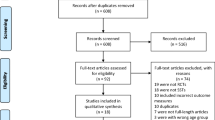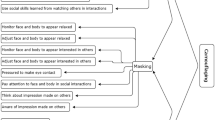Abstract
Social skills of children is a topic receiving increasing attention, particularly from clinical researchers. The present paper reviews methods that have been used to assess children's social skills. Four methods are identified and described: sociometric instruments, behavioral observations, teacher reports, and child self-reports. Their relationships to one another are examined in terms of predictive, concurrent, and construct validity. It appears that the social skills construct is in need of basic development if it is to have any clinical utility. It is suggested that future research utilize knowledge from fields closely related to clinical psychology (e.g., developmental and social psychology) and methods of assessment from traditional test theory.
Similar content being viewed by others
References notes
Van Hasselt, V. B., Hersen, M., Bellack, A. S., & Whitehill, M. B.Social skill assessment and training for children: an evaluative review. Manuscript submitted for publication, 1979.
Hymel, S., & Asher, S. R.Assessment & training of isolated children's social skills. Paper presented at the biennial meeting of the Society for Research in Child Development, New Orleans, 1977.
Asher, S. R.Coaching socially isolated children in social skills. Paper presented at Symposium on Social Skills Training in Children, AABT, Atlanta, 1977.
Greenwood, C. R., Walker, H. M., Todd, N. M., & Hops, H.Preschool teachers' assessments of student social interaction: Predictive success & normative data (Report No. 26). Eugene: Center at Oregon for Research in The Behavioral Education of the Handicapped, 1976.
References
Allen, K. E. Effects of social reinforcement on isolate behavior in a nursery school child. In L. P. Ullman & L. Krasner (Eds.),Case studies in behavior modification. New York: Holt, Rinehart, and Winston, 1965.
Bonney, M. E. Assessment of efforts to aid socially isolated elementary school pupils.Journal of Educational Research 1971,64 359–364.
Bonney, M. E., & Powell, J. Differences in social behavior between sociometrically high and sociometrically low children.Journal of Educational Research 1953,46 481–495.
Bornstein, M. R., Bellack, A. S., & Hersen, M. Social-skills training for unassertive children: a multiple-baseline analysis.Journal of Applied Behavior Analysis 1977,10 183–195.
Campbell, J. D., & Yarrow, M. R. Perceptual and behavioral correlates of social effectiveness.Sociometry 1961,24 1–20.
Charlesworth, R., & Hartup, W. Positive social reinforcement in the nursery school peer group.Child Development 1967,38 993–1002.
Clarizio, H. F. (Ed.).Mental health and the educative process. Chicago: Rand-McNally, 1969.
Clifford, E. Social visibility.Child Development 1963,34 799–808.
Combs, M. L., & Slaby, D. A. Social-skills training with children. In B. B. Lahey & A. E. Kazdin (Eds.),Advances in clinical child psychology (Vol. 1). New York: Plenum, 1977.
Conners, C. K. Symptom patterns in hyperkinetic, neurotic, and normal children.Child Development 1970,41 667–682.
Cowen, E. L., Pederson, A., Babijian, H., Izzo, L. D., & Trost, M. A. Long-term follow-up of early detected vulnerable children.Journal of Consulting and Clinical Psychology 1973,41 438–446.
Cronbach, L. J., & Meehl, P. E. Construct validity in psychological tests.Psychological Bulletin 1955,52 281–302.
Dunnington, M. J. Behavioral differences of sociometric status groups in a nursery school.Child Development 1957,28 103–111.
Evers, W. L., & Schwarz, J. C. Modifying social withdrawal in preschoolers: The effects of filmed modeling and teacher praise.Journal of Abnormal Child Psychology 1973,1 248–256.
Feshbach, S. Aggression. In P. H. Mussen (Ed.),Carmichael's manual of child psychology (3rd ed.) (Vol. 2). New York: Wiley, 1970.
Gottman, J. M. The effects of a modeling film on social isolation in preschool children: a methodological investigation.Journal of Abnormal Child Psychology 1977,5 69–78. (a)
Gottman, J. M. Toward a definition of social isolation in children.Child Development 1977,48 513–517. (b)
Gottman, J., Gonso, J., & Rasmussen, B. Social interaction, social competence and friendship in children.Child Development 1975,46 709–718.
Greenwood, C. R., Walker, H. M., & Hops, H. Some issues in social interaction/withdrawal assessment.Exceptional Children 1977,43 490–499.
Hart, B. M., Reynolds, N. J., Baer, D. M., Brawley, E. R., & Harris, F. R. Effect of contingent and non-contingent social reinforcement on the cooperative play of a preschool child.Journal of Applied Behavior Analysis 1968,1 73–76.
Hartup, W. W. Children and their friends. In H. McGurk (Ed.),Child Social Development. London: Methuen, in press.
Hartup, W., Glazer, J., & Charlesworth, R. Peer reinforcement and sociometric status.Child Development 1967,38 1017–1024.
Hersen, M., Eisler, R. M., & Miller, P. M. Development of assertive responses: Clinical measurement and research considerations.Behavior Research and Therapy 1973,11 505–521.
Kagan, J., & Moss, H. A.Birth to maturity: a study in psychological development. New York: Wiley, 1962.
Kirby, F. D., & Toler, H. C. Modification of preschool isolate behavior: a case study.Journal of Applied Behavior Analysis 1970,3 309–314.
Kohlberg, L., LaCrosse, J., & Ricks, D. The predictability of adult mental health from childhood behavior. In B. Wolman (Ed.),Manual of child psychopathology New York: McGraw-Hill, 1972.
Kohn, M., & Clausen, J. Social isolation and schizophrenia.American Sociological Review 1955,20 265–273.
Lange, A. J., & Jakubowski, P.Responsible assertive behavior. Champaign, Ill.: Research Press, 1976.
Lesser, G. S. The relationship between various forms of aggression and popularity among lower-class children.Journal of Educational Psychology 1959,50 20–25.
Magnusson, D.Test theory. Reading, Mass.: Addison-Wesley, 1966.
Marshall, R. J., & McCandless, B. R. A study in prediction of social behavior of preschool children.Child Development 1957,28 149–159.
McFall, R. M., & Lillesand, D. B. Behavior rehearsal with modeling and coaching in assertion training.Journal of Abnormal Psychology 1971,77 313–323.
McGrew, W. C.An ethnological study of children's behavior. New York: Academic, 1972.
Michael, C. M., Morris, D. P., & Soroker, E. Follow-up studies of shy, withdrawn children. II. Relative incidence of schizophrenia.American Journal of Orthopsychiatry 1957,27 331–337.
Moore, S. G., & Updegraff, R. Sociometric status of preschool children as related to age, sex, nurturance-giving, and dependence.Child Development 1964,35 519–524.
Moreno, J. L.Who shall survive? Washington, D.C.: Nervous and Mental Disease Publishing Co., 1934.
Morris, D. P., Soroker, E., & Burrus, G. Follow-up studies of shy, withdrawn children. I. Evaluation of later adjustment.American Journal of Orthopsychiatry 1954,24 743–745.
Nelson, C. M. Techniques for screening conduct disturbed children.Exceptional Children 1971,37 501–507.
O'Connor, R. D. Modification of social withdrawal through symbolic modelingJournal of Applied Behavior Analysis 1969,2 15–22.
O'Connor, R. D. Relative efficacy of modeling, shaping, and the combined procedures for modification of social withdrawal.Journal of Abnormal Psychology 1972,79 327–334.
Patterson, G. R. An empirical approach to the classification of disturbed children.Journal of Clinical Psychology 1964,20 326–337.
Peterson, D. R. Behavior problems of middle childhood.Journal of Consulting Psychology 1961,25 205–209.
Reardon, R. C., Hersen, M., Bellack, A. S., & Foley, J. M. Measuring social skill in grade school boys.Journal of Behavioral Assessment 1979,1 87–105.
Richards, T. W., & Simmons, M. P. The Fels child behavior scales.Genetic Psychology Monographs 1941,24 259–309.
Rimm, D. C., & Masters, J. C.Behavior therapy: techniques and empirical findings. New York: Academic, 1974.
Rinn, R. C., & Markle, A. Modification of skill deficits in children. In A. S. Bellack & M. Hersen (Eds.),Research and practice in social skills training. New York: Plenum, 1979.
Roff, M. Childhood social interactions and young adult bad conduct.Journal of Abnormal and Social Psychology 1961,63 333–337.
Roff, M. Childhood social interaction and young adult psychosis.Journal of Clinical Psychology 1963,19(2), 152–157.
Roff, M., Sells, B., & Golden, M. M.Social adjustment and personality development in children. Minneapolis: University of Minnesota Press, 1972.
Roistacher, R. C. A microeconomic model of sociometric choice.Sociometry 1974,37 219–238.
Ross, A. O., Lacey, H. M., & Parton, D. A. The development of a behavior checklist for boys.Child Development 1965,36 1013–1027.
Ross, D. M., Ross, S. A., & Evans, T. A. The modification of extreme social withdrawal by modeling with guided participation.Journal of Behavior Therapy and Experimental Psychiatry 1971,2 273–279.
Singleton, L. C., & Asher, S. R. Peer preferences and social interaction among third-grade children in an integrated school district.Journal of Educational Psychology 1977,69 330–336.
Slaby, R. G., & Crowley, C. G. Modification of cooperation and aggression through teacher attention to children's speech.Journal of Experimental Child Psychology 1977,23 442–458.
Smith, G. H. Sociometric study of best-liked and least-liked children.Elementary School Journal 1950,51 77–85.
Strain, P., Cooke, T., & Apolloni, T.Teaching exceptional children: assessing and modifying social behavior New York: Academic, 1976.
Ullmann, C. A. Teachers, peers, and tests as predictors of adjustment.Journal of Educational Psychology 1957,48 257–267.
Waldrop, M. F., & Halberson, C. F., Jr. Intensive and extensive peer behavior: Longitudinal and cross-sectional analyses.Child Development 1975,46 19–26.
Walker, H. M.Walker problem behavior identification checklist (WPBIC) manual. Western Psychological Services, 1970.
Walker, H. M., & Hops, H. The use of group and individual reinforcement contingencies in the modification of social withdrawal. In L. A. Hamerlynck, L. C. Handy, & E. J. Mash (Eds.),Behavior change: methodology, concepts and practice Champaign, Ill.: Research Press, 1973.
Author information
Authors and Affiliations
Additional information
Preparation of this manuscript was supported in part by NIMH grants MH288059.
Rights and permissions
About this article
Cite this article
Green, K.D., Forehand, R. Assessment of children's social skills: A review of methods. Journal of Behavioral Assessment 2, 143–159 (1980). https://doi.org/10.1007/BF01338931
Accepted:
Issue Date:
DOI: https://doi.org/10.1007/BF01338931




